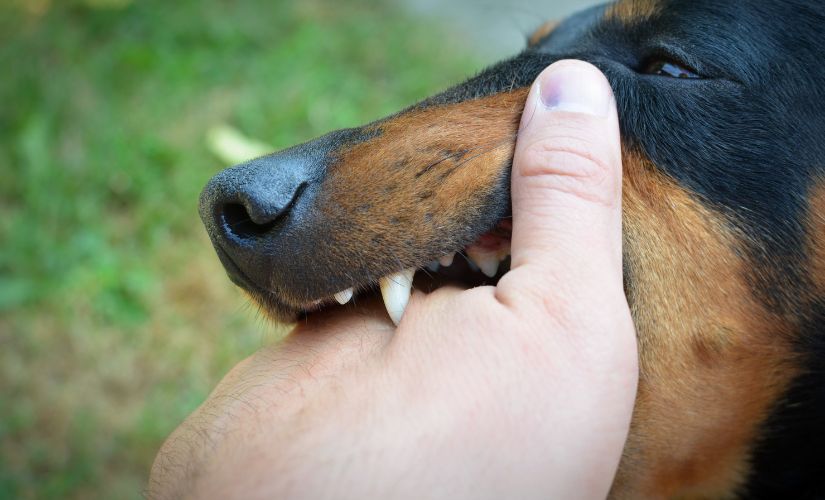Dog bites are more common than most people think and can result in serious injuries, infections, emotional trauma, and legal complications. According to the Centers for Disease Control and Prevention (CDC), about 4.5 million dog bites occur in the United States each year, and nearly 1 in 5 of those bites become infected. Children are particularly vulnerable, but adults are not immune either.
If you or a loved one is bitten by a dog, your response in the moments, hours, and days following the attack can significantly affect both your physical recovery and your ability to pursue a personal injury claim. Outlined below are the crucial steps you should take immediately after a dog bite.
1. Seek Immediate Medical Attention
Your first priority after a dog bite is your health. Even a minor-looking wound can harbor dangerous bacteria or lead to long-term damage if not properly treated.
Why Immediate Medical Care Matters:
- Infection Risk: Dogs’ mouths carry bacteria such as Pasteurella, Staphylococcus, and Capnocytophaga. Bites can lead to serious infections.
- Rabies and Tetanus: If the dog’s vaccination status is unknown or not up to date, you may require rabies post-exposure prophylaxis or a tetanus shot.
- Nerve and Tissue Damage: Some bites go deeper than the skin, potentially injuring muscles, tendons, or nerves.
- Documentation: A medical report creates an official record of the injury, which can be vital in a legal claim.
If the wound is bleeding heavily, call 911 or go to the emergency room immediately. For less severe injuries, urgent care or your primary physician should still be consulted as soon as possible.
2. Clean the Wound Properly
Before you can reach medical care, it’s important to clean the wound yourself if possible. This minimizes the risk of infection in the crucial early moments after the bite.
How to Clean a Dog Bite:
- Wash the area with soap and warm water for at least 5 minutes.
- Do not scrub the wound, as this can cause additional damage.
- Pat the wound dry with a clean cloth or sterile gauze.
- Apply an antibiotic ointment (e.g., Neosporin) to reduce infection risk.
- Cover with a clean bandage.
- Avoid tight bandages that restrict blood flow.
Even if you clean the wound yourself, this is not a substitute for professional medical care.
3. Identify the Dog and Its Owner
If the dog is not your own, try to gather the following information:
- Dog owner’s name and contact information
- The dog’s vaccination history (especially rabies)
- Whether the dog has a history of aggressive behavior
- Witness statements and contact info, if available
This information will help health professionals determine appropriate care and may also be critical if you pursue legal action.
If the owner is uncooperative or if the dog is a stray, contact local animal control or law enforcement. They can help locate the owner and determine whether the dog poses a threat to the public.
4. Report the Incident to Local Authorities
Always report a dog bite to your city or county’s animal control department or local public health department. This serves multiple purposes:
- Ensures that the dog is quarantined and observed for rabies symptoms.
- Creates an official incident report for legal and insurance purposes.
- Alerts the authorities if this dog has a history of biting or is part of a larger public safety issue.
Some jurisdictions may even require a report by law, especially if a bite results in serious injury.
5. Document Everything
Detailed documentation can make or break a dog bite injury case. It also helps you protect your rights when dealing with insurance companies or pursuing a personal injury lawsuit.
Be sure to:
- Take clear, dated photos of your injuries immediately and over time.
- Keep copies of medical records, prescriptions, and treatment recommendations.
- Save receipts for all out-of-pocket expenses, including medications, bandages, travel costs, etc.
- Write a detailed account of the incident while it’s still fresh in your memory.
- Gather statements from any witnesses who saw the incident or its aftermath.
This documentation can strengthen your claim and give your attorney the evidence needed to seek full compensation.
6. Avoid Talking to the Dog Owner’s Insurance Without Legal Counsel
Soon after the bite, you may receive a phone call or letter from the dog owner’s homeowner’s or renter’s insurance provider. While they may sound sympathetic, their goal is to minimize payouts.
Avoid doing the following:
- Do not give a recorded statement.
- Do not sign any release forms.
- Do not accept an early settlement without legal advice.
In some cases, the insurance company may try to claim that you provoked the dog or entered private property unlawfully. Let an experienced attorney handle these communications to protect your interests.
7. Know Your Legal Rights
In California, dog owners are held strictly liable for bites in most circumstances. This means that even if the dog has never bitten before or shown aggression, the owner can still be held legally responsible for your injuries.
Key California Dog Bite Laws:
- Strict Liability: California Civil Code §3342 states that the dog owner is liable if their dog bites someone in a public place or while lawfully on private property.
- No “One-Bite Rule”: California does not require proof that the dog was dangerous or that the owner was negligent.
- Time Limit: The statute of limitations for filing a dog bite lawsuit in California is two years from the date of the injury.
Because these cases are fact-sensitive, consulting with an attorney as soon as possible is essential.
8. Watch for Signs of Infection or Complications
Even if you received initial medical treatment, complications can arise days after the bite.
Common signs of infection include:
- Redness that spreads
- Swelling or warmth around the bite
- Pus or discharge
- Fever or chills
- Fatigue or confusion (signs of sepsis)
If you notice any of these symptoms, seek medical attention immediately. Left untreated, infections from dog bites can become life-threatening.
9. Consider the Emotional Impact
Dog bites can have lasting emotional and psychological effects, especially for children or those with severe injuries.
Some common emotional responses include:
- Post-Traumatic Stress Disorder (PTSD)
- Anxiety around dogs
- Nightmares or sleep disturbances
- Depression or social withdrawal
Therapy or counseling may be necessary as part of your recovery. These damages are also considered compensable in a personal injury claim.
10. Contact a Personal Injury Attorney Experienced in Dog Bite Cases
Pursuing a legal claim after a dog bite injury can be complicated, especially if the dog owner denies responsibility or the insurance company tries to minimize your damages. This is why having a skilled personal injury lawyer is so important.
If you are in Southern California, one of the top resources for legal guidance is Motorcycle Accident Attorney Orange County, who also handles dog bite injury cases.
Why Choose Motorcycle Accident Attorney Orange County?
- Experience in handling complex injury claims, including dog bites and animal attacks
- Deep knowledge of California’s strict liability laws
- Ability to negotiate with insurance companies and, if necessary, litigate in court
- Compassionate representation tailored to each client’s emotional and physical needs
- No fees unless you win your case
Whether your case involves a minor bite or a life-altering injury, the right attorney can help you secure compensation for:
- Medical expenses
- Lost wages
- Pain and suffering
- Psychological trauma
- Disfigurement or scarring
- Future medical care
Final Thoughts
Getting bitten by a dog is a frightening experience, and the aftermath can be overwhelming. However, the steps you take immediately following the incident can dramatically affect your recovery—both medically and financially.
To summarize:
- Seek medical care right away, no matter how minor the bite seems.
- Clean the wound and take steps to prevent infection.
- Identify the dog and its owner.
- Report the bite to authorities and animal control.
- Document everything: injuries, expenses, and communications.
- Avoid speaking to insurers without legal advice.
- Know your rights under California’s strict liability laws.
- Watch for delayed symptoms or emotional trauma.
- Don’t delay in consulting with an experienced dog bite injury lawyer.
If you or a loved one has suffered from a dog bite in Orange County, contact Motorcycle Accident Attorney Orange County to discuss your case and protect your rights. A consultation is free, and you’ll get the clarity and support you need to take the next step forward.




